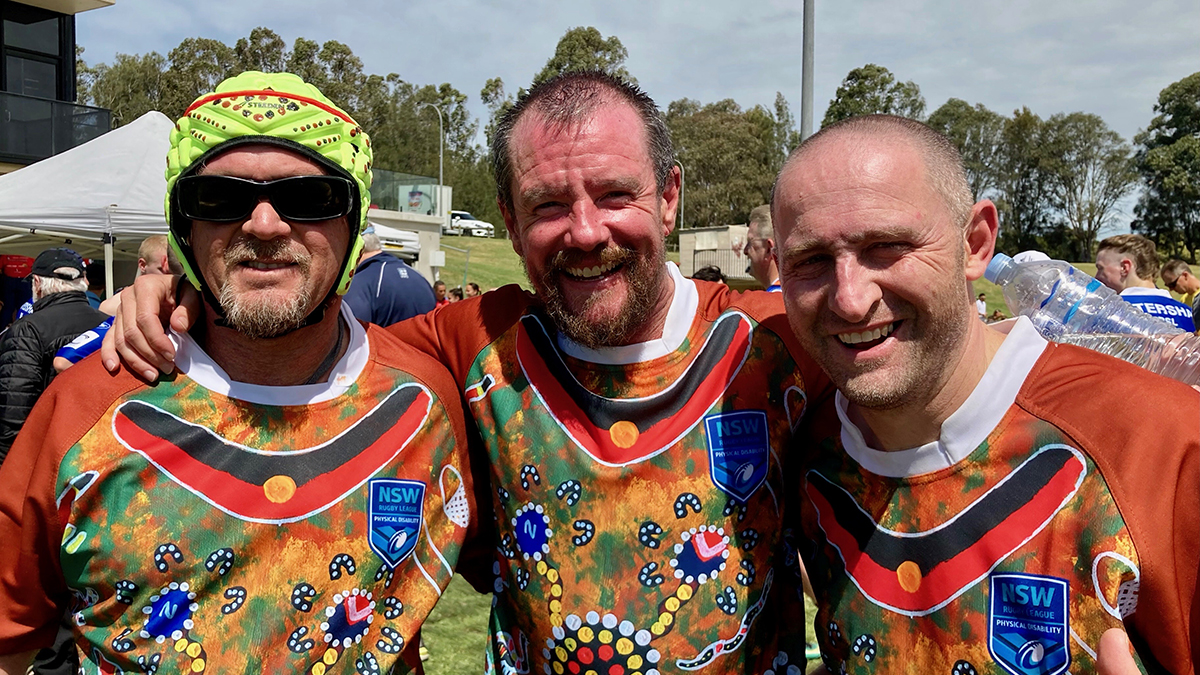
Workplace support and his managers’ commitment are mirrored in a community discovered through Physical Disability Rugby League.
In late September, Dr Alexander Smith presented a paper – ‘Yes we can! Meaningful employment following Traumatic Brain Injury’ – at the 9th National Brain Injury Australia Conference in Adelaide. A Gundungurra man, he works part-time in a disability-identified role as an Admin Assistant in UNSW Arts, Design & Architecture, assisting the School of Education in system information management.
Alex’s conference paper was his lived experience account of achieving continuing and meaningful employment in a mainstream workplace as a person with a Traumatic Brain Injury (TBI). Its focus was “the importance of collaboration between employer, line manager, healthcare providers, family members and employee”.
“With its policies and commitments, the University has helped me to find financial security, an increased social network, improved self-efficacy and better quality of life,” Alex said in his presentation.
His line managers’ commitment have had the greatest personal impact through their generous investment of time, patience and genuine care, particularly from Catherine Rowe and Jenn Perkins.
“They are passionate, dedicated advocates of inclusion, and I am incredibly grateful for their leadership, mentorship and support,” he said.
An undergraduate and postgraduate UNSW student
From Year 8 Alex knew UNSW would be “his” University where he’d study Education, despite having to travel four hours per day from his home in Greater Western Sydney. He had no doubt he would one day return to complete a Masters in Educational Leadership and a PhD in Educational Psychology.
In the final semester of his Masters and his first semester of a Psychology undergraduate degree to retrain, Alex was hit by a car while riding his motorcycle to Kensington. He sustained multiple internal lacerations to his liver and spleen, fractures to his back, a traumatic brain injury, nerve damage and other less serious injuries.
“It is almost like you have two lives – one before the accident, and one after. It took me a long time to accept my new paradigm, my new ‘operating system’, and how it works differently than before. It’s not easy. There is a real sense of loss, of mourning your ‘old’ self, of railing against the situation and the limitations it creates,” Alex said.
Post-accident he experiences several cognitive deficiencies. These include difficulty in understanding verbal communication and instructions; difficulty in word finding; memory loss; trouble understanding written text; and accelerated cognitive fatigue.
It became clear to Alex that he couldn’t continue a degree or career in Psychology and that a PhD was a viable pathway. His PhD and published work focus on educational psychology principles of reducing cognitive load; and modifying instructional design to improve knowledge acquisition, problem-solving skills and learning outcomes for individuals with chronic pain.
Finding a new way of living
Alex thought he would return to teaching after completing the PhD, but said he was “naïve about how life-changing a TBI can be”.
“You need to find a new way of living, of operating, of managing. It’s not easy, but with a great healthcare team and support network around you, it is possible to start again and build a new version of yourself,” he said.
Alex has found similar support, community and achievement through Physical Disability Rugby League. He represents his mob in the Indigenous team at Harmony 9s and NAIDOC Week. At Club level, he plays for Souths and played in the Grand Final this year. At Rep level, he plays for Country NSW and was their Captain for 2024. He is also an Australian World Cup Development Squad member and is representing Australia in a tour and test in New Zealand in early November.
“Football is very important to me. It provides me with a sense of family, of support, of community. It was the first time where I met someone my age with a brain injury and understood the daily challenges that comes with that disability,” Alex said.
“Football is a place where I feel accepted and where my disability is a point of connection, of unifying and bonding with other people. So often, I am reminded of being ‘other’, of being ‘different’, or of being considered ‘less than’. Really, all most of us want is to be accepted for who we are. I have found that acceptance at footy and at UNSW in the ADA Faculty.”
Can you tell us something about you that might surprise your colleagues?
I am a die-hard fan of the Australian Women’s Cricket Team and the Women’s Big Bash League.
What’s the best advice you ever received?
Don’t waste energy today worrying about tomorrow. Instead, direct that energy into making today even better.
What is one thing that makes you happy?
The joy and playfulness of moments out in the ocean when I’m in the line-up waiting for my next wave to hand-board – like seeing pods of dolphins riding glassy waves.
What day in your life would you like to relive?
My PhD graduation day – it was an entire day of celebrations and festivities with the amazing people who supported me on that incredible journey.
What’s the best thing you watched in the last year?
The Netflix series The Diplomat.
Photo caption: Alexander Smith (centre) with his “footy brothers” : Todd Dorward (Indigenous Elder, Australian representative, and designer of the Disability Rugby League Indigenous Jersey) on the left and George Tonna (Australian representative and founder of Physical Disability Rugby League) on the right.
Credit: Karen Fletcher.
- Log in to post comments
